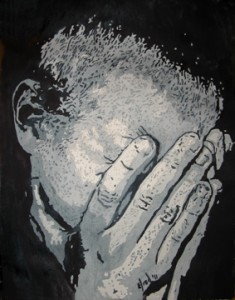 Why have we come to think of life in such dire terms?
Why have we come to think of life in such dire terms?
The answer is that stories of mistakes and failure surprise us. They are unexpected, and therefore, trigger alarm and heighten our interest.
It is a bleak commentary that of all the good content on this blog, the most read and “googled” post is one of deep sadness and woe.
The German philosopher Hegel once remarked that happiness is “the blank pages of history” because they are “periods of harmony.” Happy people generally live out their lives in obscurity.
History, on the other hand, is more often than not made by the disgruntled and discontented, the angry and rebellious—those interested in exercising authority and exploiting others and their victims.
Is it really possible that all the good things we’ve done will be dismissed and forgotten if we also happen to exercise our human nature and make mistakes?
To paraphrase a popular television soap opera, “Like sands in an hourglass, these are the blank pages of our lives.”
But shouldn’t real life be different?
Although life as it’s lived in the real world is peppered with suffering, stresses, failures, injustices and foul play, it is, for the most part lived out in hundreds of small acts of kindness, mentoring and generosity.
In short, it is the extraordinary comfort and compassion we give to others that creates goodwill, establishes the bond of sociality, and gives joy to people’s lives, even if it not been given the serious attention it deserves by our historians. Or by our television newscasters. Or by our leaders. Or by our pastors. Or by our “friends.” Or even by ourselves.
Anybody’s blank pages can be filled in and, through the love of others, complement the pages already filled with dissonance.
Anybody’s story can have a happy ending.
Anybody.
Is it possible for us to empathize with another’s joy? Or will we continue to allow those pages to be blank?
Oftimes empathizing with another person’s joy comes from a deep understanding of their struggles. Another person’s empathic embrace can even transform one’s own suffering to joy.
Is it possible for us to write in the blank pages of each other’s lives?
Carl Rogers puts it poignantly:
When a person realizes he has been deeply heard, his eyes moisten. I think in some real sense, he is weeping for joy. It is as though he were saying, “Thank God, somebody heard me. Someone knows what it’s like to be me.
Question: In the words of my therapist, “How does this make you feel?”
If these words filled in a sentence or two of your blank pages, please share them and fill in a sentence for someone else by taking a moment and clicking one of the buttons below.
This post was greatly influenced by Jeremy Rifkin and his book “The Empathic Civilization.“
Leave a Reply